Talk | Puerto Rican Archives: Preserving Community Memory
April 05, 20249:30 am - 6:00 pm
April 06, 202410:00 am - 3:15 pm
All tickets have been claimed. Please see the Schedule for sessions open to all.
English and Spanish CART captioning is provided, with American Sign Language available upon request.
This program takes place at The National Museum of Puerto Rican Arts and Culture, 3015 W Division St.
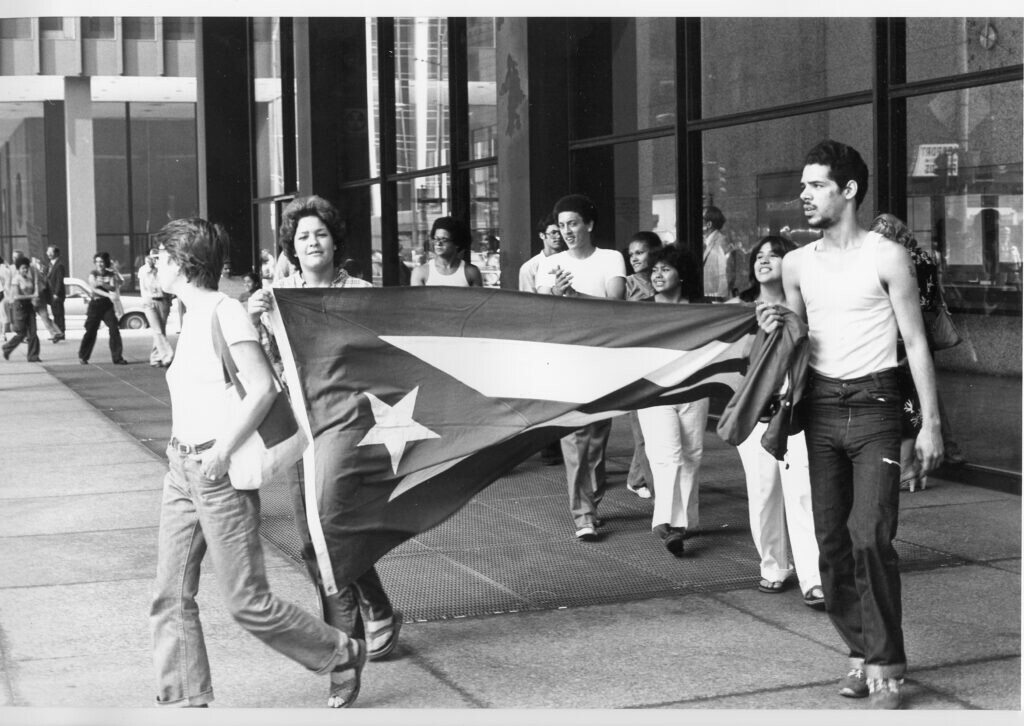
Image courtesy of Digitizing the Barrio archive at the Puerto Rican Cultural Center.
About the Event
Puerto Rican Archives: Preserving Community Memory is a two-day symposium* focused on the political potency of Puerto Rican archives—both on the island and in the diaspora.
The symposium is a collaboration between Digitizing the Barrio (an archival project of the Puerto Rican Cultural Center), The National Museum of Puerto Rican Arts and Culture, and the Museum of Contemporary Art Chicago. It extends the focus on collective histories highlighted through photographs and ephemera documenting social movements and community organizations in the MCA exhibition entre horizontes: Art and Activism Between Chicago and Puerto Rico.
The symposium foregrounds archives that house histories of Puerto Rican protest including speakers from presenting Chicago institutions, PRCC and NMPRAC; representatives from Puerto Rico-based organizations Archivera General de Puerto Rico, Archivo Histórico de Vieques, Archivo Comunitario LGBTQ+ de Puerto Rico, and Memoria Decolonial; and CENTRO in New York.
Through panels, a keynote, and workshops, the symposium aims to generate dialogue, connection, and community engaged learning around key Puerto Rico and diasporic events.
The symposium takes place on April 5 and 6, 2024, at the National Museum of Puerto Rican Arts and Culture, 3015 W Division St, Chicago, IL 60622.
*This is a free event with registration.
English and Spanish CART captioning is provided, with American Sign Language available upon request.
Schedule
DAY 1: Friday, April 5
(REGISTRATION FULL)
9:30–10 am
Welcome
Welcome by the National Museum of Puerto Rican Arts and Culture, the Museum of Contemporary Art Chicago, and Digitizing the Barrio with Billy Ocasio and Michael Rodríguez-Muñiz.
10-11:20 am
Session 1: Puerto Rican Archives Across Space and Scales
Archivera General de Puerto Rico, Archivo Histórico de Vieques, Archivo Comunitario LGBTQ+ de Puerto Rico, CENTRO and Digitizing the Barrio each briefly present an introduction to each archive—what they collect and why—to highlight diverse ways their collection and preservation strategies engage various dimensions of Puerto Rican history.
Moderator: Brianna Van Schoyck
Presenters:
- Javier E. Laureano
- Hilda Ayala González
- Diana Ramos Gutiérrez
- Rafael V. Capó García
- Cristina Fontanez Rodriguez
11:30 am–12:50 pm
Session 2: Archiving 101
Digitizing the Barrio, Archivera General de Puerto Rico, and El Centro introduce basic approaches to archiving for those who are interested in preserving their histories through documents, photos, and other ephemera.
Moderator: Veronica Ocasio
Presenters:
- Angelica Hernandez
- Hilda Ayala González
- Herbert Duran
1–2 pm
Lunch
2–3:20 pm
Session 3: The Politics and Ethics of Memory
The session discusses how archives themselves are contested sites of memory—influenced in some cases by colonial practices—and how archivists and memory-workers at Memoria Decolonial, Archivo Histórico de Vieques, and CENTRO archive and generate counter-storytelling narratives.
Moderator: Margaret Power
Panelists:
- Rafael V. Capó García
- Diana Ramos Gutiérrez
- Cristina Fontanez Rodríguez
- Carmen T. Pérez González
3:30–4:50 pm
Session 4: History-Making and Meaning-Making
How do organizations address gaps and silences in community histories and create space for public engagement with such histories? This session includes members of the NMPRAC, Digitizing the Barrio, and the Archivo Comunitario LGBTQ+ de Puerto Rico who discuss the role of oral history interviews and other methods of making history and collective meaning.
Moderator: Angelica Hernandez
Panelists:
- Veronica Ocasio
- Margaret Power
- Javier E. Laureano (Virtually)
5–6 pm
Reception
DAY 2: Saturday, April 6
10 am–12 pm
Interactive Workshop: Building Personal and Family Archives (REGISTRATION FULL)
This workshop teaches participants how to build their own archives—co-facilitated by NMPRAC, Digitizing the Barrio, and CENTRO.
Moderator: Brianna Van Schoyck
Facilitators:
- Cristina Fontanez Rodríguez
- Hilda Ayala González
- Herbert Duran
- Angelica Hernandez
Noon
Boxed-Lunch served (REGISTRATION FULL)
12:30–1:45 pm
End Note: Barrio Under Siege: Memories of Political Repression in Puerto Rican Chicago (NO REGISTRATION REQUIRED)
This session reflects on histories and memories of political repression against Puerto Rican anticolonial activists and movements in Chicago. It features a moderated discussion between historical figures, José E. López, executive director of the Puerto Rican Cultural Center, and Michael Deutsch, attorney at the People’s Law Office (retired).
Moderator: Cristina Pacione-Zayas (invited)
Panelists:
- José E. López
- Michael Deutsch
2–3:15 pm
Keynote: Yomaira C. Figueroa-Vásquez, Director of CENTRO (NO REGISTRATION REQUIRED)
The current director of the largest archive foregrounding Puerto Rican history, CENTRO, gives the symposium’s keynote presentation.
About the Speakers
Angélica Hernández
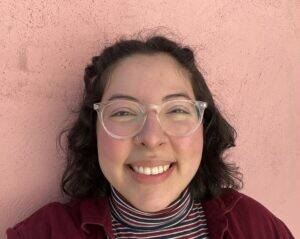
Image courtesy of the speaker.
Angélica Hernández is the archivist for the Digitizing The Barrio archive project, a project of the Puerto Rican Cultural Center. She received her Masters in Library and Information Science with a certificate in Archives and Cultural Heritage Resources and Services from Dominican University in 2022. Hernández is deeply passionate about community engagement, equitable access to information, and participatory archival practices.
Cármen T. Pérez

Image courtesy of the speaker.
Carmen T. Pérez-González is currently the Director of the National Library of Puerto Rico, housed in the Institute for Puerto Rican Culture. She had previously been Director of the Library of the Ana G. Méndez University, Carolina Campus, where she has also taught courses for the General Education Program within the Division of Liberal Arts. She has been a professional librarian since 2011. She has a Master’s in Information Science (MIS) from the University of Puerto Rico, Río Piedras Campus. She is currently working on her dissertation as the final requisite for a dual program of a Doctorate (Ed.D.) in Education, with an emphasis in Leadership in Educational Organizations, as well as a Master’s in education in Educational Research and Evaluation, also from the University of Puerto Rico. She has conducted research on assessment planning in online graduate programs, on the challenges of distance learning, among other things.
Cristina Fontanez Rodríguez
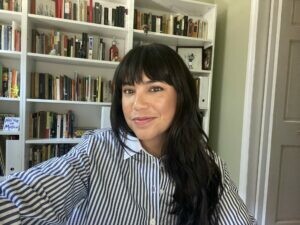
Image courtesy of the speaker.
Cristina Fontánez Rodríguez is the Archival Collections Manager at the Archives of the Puerto Rican Diaspora at CENTRO. Cristina’s work is focused on participatory and non-hierarchical ways of knowledge-seeking and making through archival practice. Previous to coming to CENTRO, Cristina was Visiting Assistant Professor and Institute Archivist at Pratt Institute and is a former fellow for the National Digital Stewardship Residency for Art Information. She is a founding member of Archivistas en Espanglish, a collective dedicated to amplifying spaces of memory-building between Latin America and Latinx communities in the US and co-runs Barchives, an independent outreach initiative that brings archivists to bars to talk about New York City’s archival collections and local history. Cristina holds a BA in Geography from Universidad de Puerto Rico Recinto de Río Piedras and a Master’s in Library Science with a certificate in Archives and Preservation of Cultural Materials from CUNY Queens College.
Diana Ramos Gutiérrez

Diana Ramos. Photo: Herminio.
Diana Ramos Gutiérrez is a human rights focus journalist, arts administrator, and photographer based in Vieques, Puerto Rico. She collaborates with independent media in Latin America and was part of Radio Vieques, a community radio station that served the island for seven years. Ramos-Gutiérrez is a cultural agent and educator at the Vieques Historical Archive, a community organization that encourages participation around historical materials and Vieques cultural heritage, viewed from the people in struggle and resistance. She is also director of the Vieques Film and Human Rights Festival.
Herbert Duran
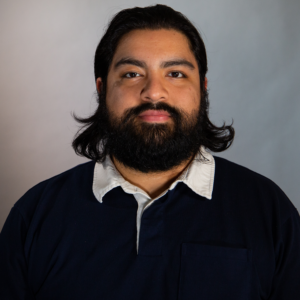
Image courtesy of the speaker.
Herbert Duran is currently the Assistant Archivist at the Center for Puerto Rican Studies (CENTRO) where he’s worked since 2022. Herbert is also a member of the Programming Committee with the Archivist Roundtable of New York, a nonprofit group made up of over 400 archivists and record managers throughout the New York Metropolitan area, where he organizes tours and presentations throughout a variety of archival repositories. Prior to becoming an archivist, Herbert was a case worker at Housing Works, where he helped NYC residents find housing and obtain social benefits and entitlements. He holds a Master in Library and Information Science from Pratt Institute.
Hilda Ayala González
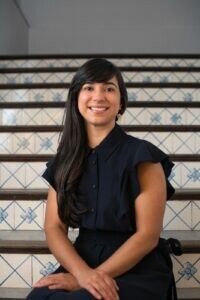
Image courtesy of the speaker.
Hilda Teresa Ayala González has a master in Archival Studies from the University of British Columbia in Vancouver Canada and a master’s in Library Science from the University of Puerto Rico. She has worked in various work settings as a librarian, archivist, consultant, and professor. Her areas of interest include preventive conservation and access to information resources, both in physical and digital formats through description, digitization and outreach projects. Previously she worked as the Research Services Librarian at the University of Puerto Rico in Mayaguez providing workshops and developing research guides about digital scholarship and data management. She also helped establish and developed the digital institutional repository and the preservation workshop at the library after the impact of Hurricane Maria in 2017. In 2019 she joined the Instituto de Cultura Puertorriqueña and was responsible of establishing the preservation and digitization program. Currently, she is the General Archivist of Puerto Rico.
Javier E. Laureano
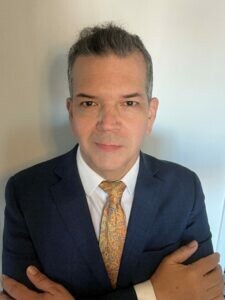
Image courtesy of the speaker.
Javier Laureano obtained his PhD from the Department of History at the University of Puerto Rico. His doctoral thesis became the book San Juan Gay: conquista de un espacio urbano, 1948-1991, published by the Editorial del Instituto de Cultura Puertorriqueña in 2016. Dr. Laureano has researched on topics such as the transgender issue—specifically transformism—the gay political movement, the history of AIDS, violence against the queer community and the preaching of sexual abstinence in schools, among others. He has participated in multiple conferences and has published articles on queer issues in magazines such as Centro Journal, Sargasso, and Historia y Sociedad.
In 2020, Laureano funded the LGBTQ+ Community Archive of Puerto Rico. He currently lives in New York City and works for the Environmental Protection Agency (EPA).
José E. López
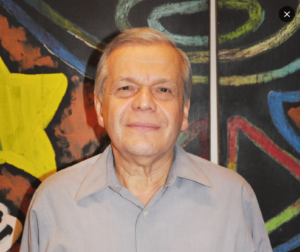
Image courtesy of the speaker.
José E. López was born in 1949 in San Sebastián, Puerto Rico. In 1959, his family moved to Chicago as part of the massive Puerto Rican migration to the United States. He has written extensively on the political and social reality of Puerto Ricans in the United States while serving as Executive Director of The Puerto Rican Cultural Center Juan Antonio Corretjer in Chicago, which he cofounded in 1973, and he is an adjunct instructor at Northeastern Illinois University, Columbia College, and the University of Illinois at Chicago.
In his role as educator/activist, he has been invited to speak at over 50 colleges and universities in the United States, Mexico, Canada, and Puerto Rico as well as in international forums such as the United Nations Decolonization Committee. For over 40 years, he has been a leading member of the Puerto Rican independence movement and is also the editor of “Puerto Rican Nationalism: A Reader.” Presently, he is active in developing new/praxis/theory in community and social empowerment, particularly in the areas of educational reform through the Community as a Campus Initiative, and addressing health inequities through the building of a holistic community of wellness in Chicago’s Greater Humboldt Park communities. He has served on various Boards including Bethany/Advocate Fund Board and presently on the Chicago Public Schools Latino Advisory Committee to CEO Barbara Byrd Bennett.
He is an important voice for policy and legislative reform working closely with the former Alderman Billy Ocasio, Alderman Roberto Maldonado, Cook County Commissioner Edwin Reyes, State Representative Cynthia Soto, State Senators William Delgado and Iris Martínez and Congressman Luis V. Gutiérrez. Over the years he has received many recognitions, including the Cook County Board of Commissioners 2009 Hispanic Heritage Award, the 2010 Health Award from Health and Medicine Policy Research Group, and the Chicago Cultural Alliance: 2014 Outstanding Community Leader Award.
Margaret Power
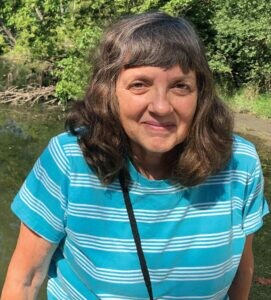
Image courtesy of the speaker.
Margaret Power is co-director of Digitizing the Barrio and president of the Board of Directors of the Puerto Rican Cultural Center. She is also co-chair of Historians for Peace and Democracy. She is a professor emeritus of History at the Illinois Institute of Technology. She has authored or co-authored seven books, the recently released Solidarity Across the Americas: The Puerto Rican Nationalist Party and Anti Imperialism and Right-Wing Women in Chile: Feminine Power and the Struggle Against Allende.
Michael Deutsch
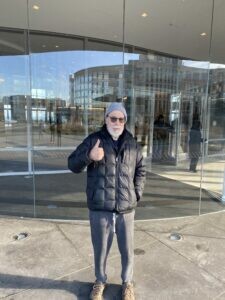
Image courtesy of the speaker.
Michael Deutsch has been a lawyer with the People’s Law Office and a Guild member since 1970. From 1991 to 1996 he was the Legal Director of the Center for Constitutional Rights. Michael’s legal career has been devoted to the representation of political activists and political prisoners. He was one of the criminal defense lawyers for the rebelling Attica prisoners, a coordinator of the Attica Brothers Legal Defense, and one of the class counsels in the Attica civil suit which, after two decades of litigation, resulted in a $12 million settlement. He was attorney for the five Puerto Rican Nationalist prisoners imprisoned in the 1950’s who won an unconditional sentence commutation from President Carter in 1979, and represented Puerto Rican independentistas in Chicago, New York and Hartford who were charged with seditious conspiracy, the Wells Fargo expropriation, and subpoenaed before federal grand juries. He also helped to develop the “Prisoner of War” claim under international law for Puerto Rican prisoners.
Michael has defended Black Panthers, Black prisoners facing the death penalty, and was part of the legal team that challenged the first use of the high security “control units” for men at Marion Federal Prison and for women at Lexington Federal Prison. More recently, Michael successfully defended Chicago Palestinian community activist Muhammad Salah charged with Terrorism and RICO as well as Palestinian community organizers targeted by the FBI and subpoenaed to a federal grand jury. Also more recently, Michael represented Rasmea Odeh, the deputy director of the Arab American
Action Network (AANN), a former Palestinian political prisoner and torture survivor, who had been charged with providing false information on her naturalization application, nine years after she had received her citizenship. She was stripped of her US citizenship and after months of litigation was deported to Jordan and now resides in Ramallah. Michael Deutsch has written and lectured extensively on prisons, international human rights, and political repression.
Michael Rodríguez-Muñiz

Image courtesy of the speaker.
Michael Rodríguez-Muñiz is an associate professor of sociology at the University of California, Berkeley. He is part of Berkeley’s Latinx and Democracy cluster and co-director of the Latinx Social Science Pipeline initiative. His research focuses on race and the politics of knowledge, primarily in Latinx communities and movements. His first book, Figures of the Future: Latino Civil Rights and the Politics of Demographic Change (Princeton University Press, 2021), was awarded the best book prize from ASA’s Latino/a Sociology, Cultural Sociology, and Population sections and received an honorable mention from the Collective Behavior and Social Movements section. The book is based on his award-winning dissertation. His work has also appeared in the American Journal of Sociology, American Journal of Cultural Sociology, Du Bois Review, American Behavioral Scientist, among other outlets. Along with several collaborative projects, Michael is immersed in an oral history book project on the afterlives of anticolonial resistance and political repression in Puerto Rican Chicago. He also co-leads Digitizing the Barrio, an archival project of the Puerto Rican Cultural Center.
Rafael V. Capó García
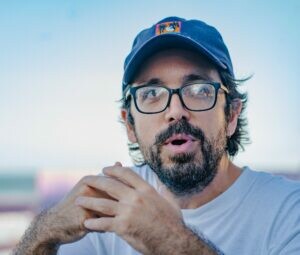
Rafael V. Capó García. Photo: Mikey Cordero.
Rafael V. Capó García is currently Assistant Professor at the University of Puerto Rico at Río Piedras, and a PhD candidate at the University of British Columbia’s Department of Curriculum and Pedagogy where he teaches courses on education and decolonization. He worked as a public-school Social Studies teacher for eight years in his hometown of Santurce, Puerto Rico and completed an MA in History in 2016 at the Center for Advanced Studies in Puerto Rico and the Caribbean. His research interests include Caribbean philosophy, (de)coloniality, critical heritage, and decolonizing education. Rafael is also the director of Memoria (De)colonial, a non-profit 501(c) organization and collective of researchers and educators that rethink colonial heritage sites in Puerto Rico through digital and public humanities.
Veronica Ocasio
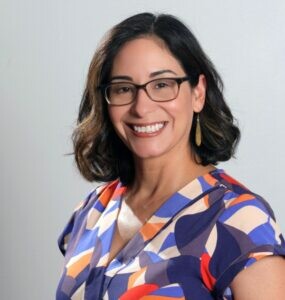
Image courtesy of the speaker.
Veronica Ocasio, a proud daughter of Chicago’s Humboldt Park community, is a passionate advocate with a deep commitment to community service. Raised by her Puerto Rican single mother, Veronica learned the value of giving back from a young age, attending rallies for social justice and equality with her mother. After graduating from Roberto Clemente High School and earning a history degree from the University of Illinois at Urbana Champaign, Veronica confronted challenges faced by students of color. This led to her commitment to making a difference as an educator, and she assumed roles as a Childcare Supervisor, bilingual Childcare Welfare specialist, and Master High School Teacher. After receiving a fellowship to obtain her Master’s in Urban Planning and Public Policy, she worked on ensuring affordable housing and economic development opportunities for her community. Veronica’s impactful work garnered attention, and she played a pivotal role in securing $200 million in investment opportunities for Humboldt Park as the District Director for Congressman Luis Gutiérrez. Veronica’s commitment to making a difference extends beyond local boundaries, as demonstrated by her humanitarian trips to Haiti and the Dominican Republic. Her passion is to create a lasting legacy through her involvement in developing the National Museum of Puerto Rican Arts and Culture. She dedicated 18 years as a volunteer before officially joining the team.
In 2022, Veronica accepted the Director of Education and Programming role at the National Museum of Puerto Rican Arts and Culture; simultaneously, she embarked on a doctoral journey in non-profit organizational leadership. Married to Billy Ocasio for 20 years, she is the proud Mom to Ismael, 27, Gabriel, 20, and Antonio, 17. Veronica’s steadfast commitment to making a positive impact underscores her collaborative spirit, robust work ethic, and principled leadership.
Yomaira C. Figueroa-Vásquez
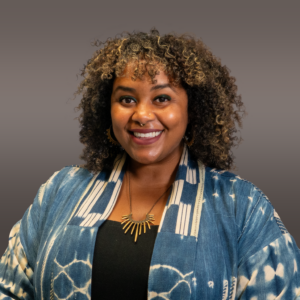
Image courtesy of the speaker.
Yomaira C. Figueroa-Vásquez is an Afro-Puerto Rican writer, teacher, and scholar from Hoboken, NJ. She is Professor of Africana, Puerto Rican, and Latino Studies at CUNY Hunter and is the Directora of the Center for Puerto Rican Studies (CENTRO). She is author of the award-winning book Decolonizing Diasporas: Radical Mappings of Afro-Atlantic Literature (Northwestern University Press, 2020; translation, Editora Educación Emergente, 2023), and the forthcoming book The Survival of a People (under contract with Duke University Press). Her published work can be found in journals including Hypatia, Decolonization, CENTRO, Small Axe, Frontiers, Hispanofilia, Contemporânea, Diálogos, and Feminist Formations.
A first-generation high school and college graduate, Dr. Figueroa-Vásquez is passionate about mentoring underrepresented and first-generation students. She earned her BA in English, Puerto Rican & Latino Studies, and Women’s & Gender Studies at Rutgers University, New Brunswick (Douglass College) and her MA and PhD in Comparative Ethnic Studies at UC Berkeley. At her former institution (Michigan State University) she founded the Mentoring Underrepresented Students in English Program (MUSE), the Womxn of Color Initiative, #ProyectoPalabrasPR, and the award-winning digital/material project Taller Electric Marronage.
She has served on the leadership board of the American Studies Association, The Puerto Rican Studies Association, the Caribbean Philosophical Association, the Latin American Studies Association, and the Modern Languages Association. Dr. Figueroa-Vásquez was a Duke University Mellon SITPA Fellow, a Ford Foundation Postdoctoral Fellow, and a Cornell University Society for the Humanities Fellow. She is the PI and co-director of the 2022–2024 Andrew W. Mellon funded “Diaspora Solidarities Lab,” a $2M Higher Learning project focused on Black feminist digital humanities initiatives that support solidarity work in Black and Ethnic Studies.
Related Content
Video
Curator Anaís Cezanné Caro-Rosario speaks about the Puerto Rican Cultural Center’s murals in Chicago’s Humboldt Park.
Video documentation of the symposium.
Funding
Program
Lead support for the 2023-24 season of MCA Talks is made possible by The Richard and Mary L. Gray Lecture Series through a generous gift to the Chicago Contemporary Campaign.
Generous support is provided by The Antje B. and John J. Jelinek Endowed Lecture and Symposium on Contemporary Art; the Kristina Barr Lectures, which were established through a generous gift by The Barr Fund to the Chicago Contemporary Campaign; The Gloria Brackstone Solow and Eugene A. Solow, MD, Memorial Lecture Series; and the Allen M. Turner Tribute Fund, honoring his past leadership as Chair of the Board of Trustees.
Exhibition
Lead support is provided by the Harris Family Foundation in memory of Bette and Neison Harris, Zell Family Foundation, Cari and Michael Sacks, the Mellon Foundation, and the Terra Foundation for American Art.
Major support is provided by the Jacques and Natasha Gelman Foundation and Jana and Bernardo Hees.
Generous support is provided by Marilyn and Larry Fields.
This exhibition is part of Art Design Chicago, a citywide collaboration initiated by the Terra Foundation for American Art that highlights the city’s artistic heritage and creative communities.
Digitizing the Barrio is a project of the Juan Antonio Corretjer Puerto Rican Cultural Center. This event is made possible with the support of the Council on Library and Information Resources (CLIR). We are also grateful for funding from the University of California, Berkeley and its Department of Sociology.
The National Museum of Puerto Rican Arts and Culture’s (NMPRAC) Archive and Collections Research Center will serve as a dedicated repository for artifacts, documents, art, objects, books, records, films, and other materials that embody the cultural richness of Puerto Rican heritage in Chicago and the diaspora. By preserving these items, the center aims to safeguard the collective history and memories of the Puerto Rican community. We are grateful for funding and support from the City of Chicago’s Department of Cultural Affairs and Special Events (DCASE), and Illinois Arts Council Agency.